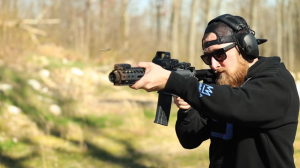45 vs. 9mm is one of the most heated debates in the handgun industry. Whether it be for defensive use or sport, several distinctions might influence whether you choose a 45 or 9mm handgun. So, what are the most distinguishable characteristics that set the two handgun styles apart?
What We'll Cover
| Characteristics | 45 | 9mm |
| Recoil | Aggressive, requires particular training | Quick, comparatively low level |
| Ballistics | Powerful, particularly penetrable quality | Ripping, piercing, less stop force required |
| Suppressed | Retains accuracy but still produces loud gunshot | Loses accuracy, but noise is reduced substantially |
| Size | One of the largest handgun bullets | Small, compact bullet |
| Velocity | Comparatively slower | One of the fastest handgun bullets |
Read on to learn more about 45 vs. 9mm: the ultimate comparison. This is heralded as The Great Debate by countless handgun experts. Below, you will learn the different advantages and disadvantages that might persuade you to choose a side.
45 Vs. 9mm Recoil
One of the most important aspects of your firearm will likely be how much recoil it has. You want to be able to control your shots, especially if you are releasing consecutive bullets from the chamber. An overly aggressive reload can disrupt your aim and thus, cause you to miss your target.
As nice as it would be for a handgun to have little to no recoil, the fact of the matter is that the larger the bullet, the more recoil your handgun will have. When a bullet is fired from a gun, it pushes off of a spring inside the chamber. How large your bullet is determines how much force that spring will cause the gun to recoil back towards you.
45 Recoil
One of the most common handgun cartridges used for 45 ammo is a .45 ACP (Automatic Colt Pistol). The recoil for a 45 can have push-back energy of up to ten pounds. This may not sound like a significant amount. However, consider both self-defense and shooting range circumstances with a handgun. Shooting off multiple rounds - each pushing back on you with nearly ten pounds of force - can quickly turn into an inaccurate sequence.
If you are not aware of the recoil energy of a 45, the power can catch you off-guard in less-than-optimal circumstances. You must train yourself to keep a steady, solid hand when firing a 45, or else the recoil will significantly affect your outcome.
Of course, recoil power will vary depending on the specific type of gun you are using. Occasionally, a 45 might have less recoil than a more heavy-duty model 9mm cartridge. On average, however, 45 recoil is overwhelmingly more powerful.
- More powerful recoil typically means a more powerful gun
- 45 recoil energy can be double that of 9mm recoil
- Up to ten pounds of recoil force can make handling more difficult
9mm Recoil
As you might have already guessed, the recoil of a 9mm is substantially less than a 45. Although, this may not always be what you are looking for. Regardless, 9mm recoil power stays in the four to five-pound range, making for a shot with easy handling and precise accuracy.
Because a 9mm bullet is so much smaller than a 45, it makes sense that, when leaving the chamber, it pushes back on you with less force. In terms of accuracy, a 9mm is the way to go, especially for amateur shooters. However, one problem that some might run into is becoming too "trigger happy" - that is, releasing rounds too quickly.
If you try to unload an entire clip too quickly, the low recoil energy really does not help all that much. Just because a 9mm has less recoil than a 45 does not mean it deserves any less professionalism and responsibility. You must make sure to follow proper gun safety rules when using any firearm.
- Less recoil allows better handling and improved accuracy
- Some might be tempted to fire rounds too quickly, making the advantage of less recoil irrelevant
Why Recoil Force Is Important

You know that recoil energy affects accuracy, but once you have gotten that part down, why is knowing the recoil of your gun important? Well, the recoil energy from a gun can cause several safety issues if you are not aware of it.
If you have never used a handgun before, you might be surprised at the power that can push back towards you when firing a round, regardless if it is a 45 or 9mm. Although handguns are smaller than many other guns, they are still dense machines that require a lot of force. The larger the bullet and the gun, the more recoil you are going to have. So, if you have shot a 9mm before but have never handled a 45, do not expect the experience to be the same.
Universal Magazine Speed Loader for 9mms & .45s

45 Vs. 9mm Ballistics
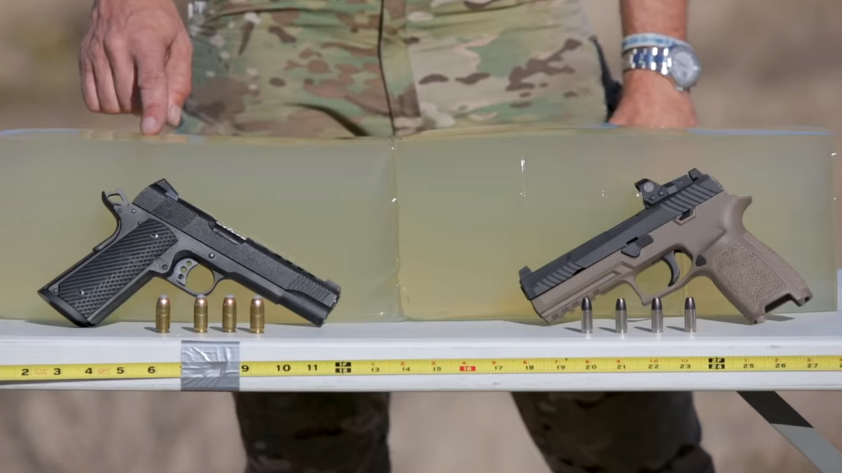
Several characteristics define the ballistics of different caliber bullets: the diameter of the bullet itself, what the bullet does on impact, grain amount, gunpowder level, and more. While some of these aspects are not entirely relevant when debating 45 and 9mm, some might heavily influence your choice.
It is important to note that some ballistic characteristics of the same bullet vary completely, so the below information may not always be what you come across. In any case, it is good to have a general idea of the ballistics of both a 45 and 9mm. Since there is a separate section for 45 vs. 9mm size, there will not be as much detail about that immediately.
It is also essential to keep in mind that when discussing the physical ballistic characteristics of a bullet, this involves both shooting things like gel targets and the act of self-defense.
45 Ballistics
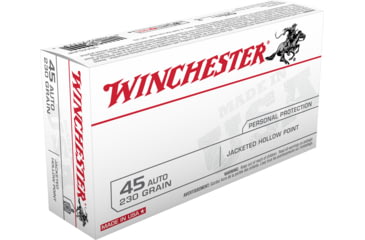
Product Info for WINCHESTER .45 ACP 230 grain Jacketed Hollow Point Centerfire Pistol Ammunition
Backed by generations of legendary excellence, Winchester "USA White Box" stands for consistent perf...
One of the biggest things to discuss between the ballistics of a 45 and 9mm is the "stopping power." Although handguns are technically not considered guns with stopping force, this characteristic can still be applied.
You might find different results in every article you read. Many expert shooters have their own opinions on whether the stopping power of a 45 or 9mm is better. In the most basic description, a 45 bullet is wider. Thus, on impact with a hollow point 45 bullet, as the bullet head mushrooms out, it may look and/or feel like a much wider penetration.
However, a 45 does not have as much velocity as a 9mm, so it may not penetrate as deeply, and therefore will not have as much stopping power.
Another notable ballistic characteristic is the foot-pounds (ft-lb) of muzzle energy. The larger ft-lb a bullet has, the more powerful it will be. A 45 bullet typically has 355 ft-lb of muzzle energy. For a handgun, this is an insane amount of power.
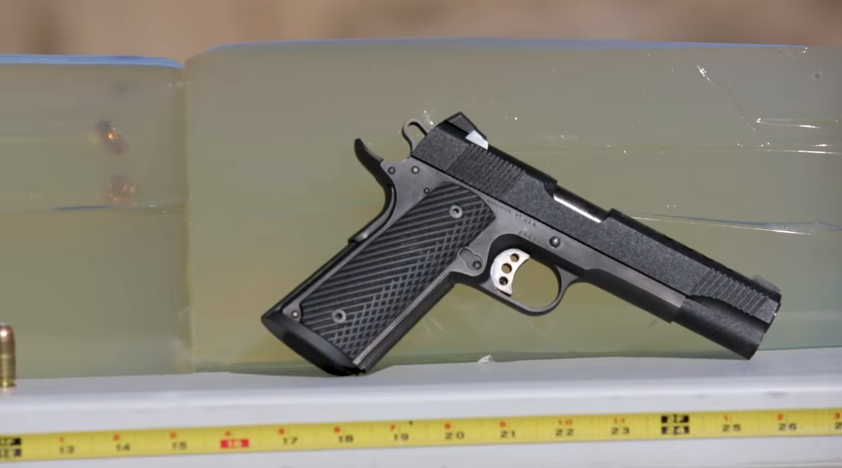
45 bullets also tend to hold more gunpowder than a 9mm. As you may already know, the larger bullet requires a more powerful burning of gunpowder to send it out of the barrel. So, while it has more gunpowder than a 9mm, the larger size of a 45 cancels that out somewhat.
- Holds more gunpowder
- Larger surface area for mushrooming on impact
- Bigger size reduces penetration depth
9mm Ballistics
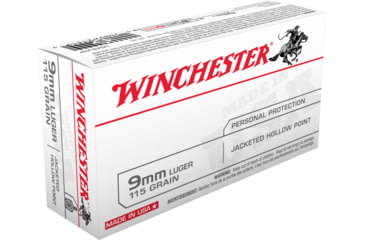
Product Info for Winchester USA HANDGUN 9mm Luger 115 grain Jacketed Hollow Point Centerfire Pistol Ammunition
Backed by generations of legendary excellence, Winchester "USA White Box" stands for c...
Where The Great Debate between a 45 and a 9mm gets extremely heated is discussing the stopping power of a 9mm. As you know from above, a 45 is wider, which may make it seem like it would have more stopping power. However, this is not always the case.
Since a 9mm is smaller and lighter than a 45, it moves more quickly than a 45. So, upon impact, the 9mm will penetrate the target much deeper than a 45. It is shot out of the barrel at a much higher velocity, so it takes more stopping power to halt the bullet.
A 9mm also has a greater capacity. Because of their smaller size, you can hold more 9mm bullets in your magazine than you can 45 bullets. Some people, however, prefer larger bullets to more bullets, so it is really up to you to decide which characteristic is better.
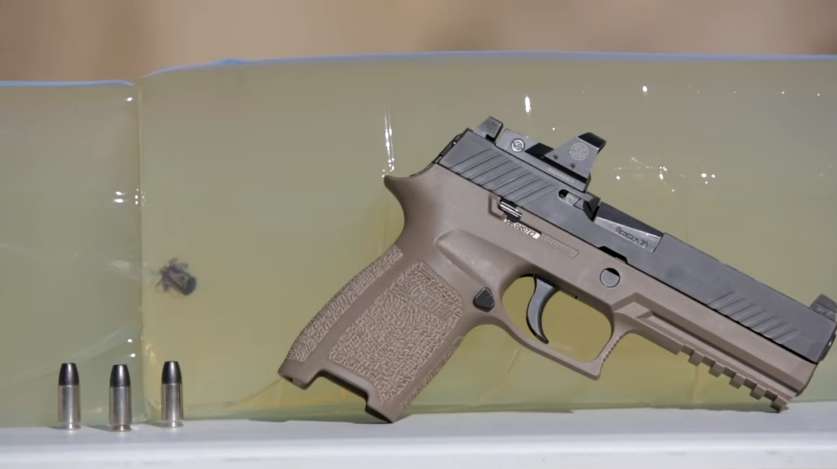
It seems that when you take one advantage, you give up another. In the debate between bigger bullets vs. bigger capacity, different people will choose different things, even in similar situations.
Hypothetically, consider the case of self-defense from a home intruder. You may believe that one bullet or the other has better stopping power, so you will go with that gun. However, some people opt for a 45 because it may lessen the risk of your bullet going through extra walls and causing damage inside or outside of your house since it is larger. On the other hand, the speed of a 9mm might make people practicing self-defense more comfortable when protecting themselves from an intruder.
- A lighter bullet exits the chamber faster and, as a result, may have more stopping power and deeper penetration
- 9mm has a larger capacity
- The debate between size and capacity is probably never going to find common ground
Other Ballistic Considerations
Although there are distinct ballistic features between a 45 and a 9mm, you must also consider what specific type of bullet you have. There are two main models of a bullet: full metal jacket (FMJ) and hollow point.
An FMJ bullet is made of a lead core with a metal shell. These dense bullets are excellent for target practice because they have great penetration capacity and are less likely to become deformed and mushroom on impact.
A hollow point, on the other hand, provides many different results. People often use hollow-point bullets for something like hunting because the hollow point expands on impact, making the bullet better able to tear at the animal's insides. Hollow points - as you might have guessed - have hollowed out tips and centers.
45 and 9mm bullets both come in FMJ or hollow point form, so the choice is up to you. If you are shooting at something solid, you might consider FMJ bullets. Hollow-point bullets are better for soft targets.
45 Vs. 9mm Suppressed
If you have a suppressor on your gun, your bullet will sound and act differently as it leaves the chamber. No matter what, a suppressor is going to lower the sound of a gun when it fires a bullet. Other than that, a suppressor can affect the accuracy of your shot.
The way that a suppressor works is by capturing the gas emitted upon release of a bullet, giving it a space to expand, and thus lowering the volume of a gunshot. It can be beneficial for multiple circumstances: a gun range, people with particular sensitivity to loud noises, shooting while other people are present, etc.
It is important to note that a suppressor does not work as it does in movies and video games. A suppressed gunshot is still very loud and can damage your ears in many circumstances.
45 Suppressed
A 45 without a suppressor produces somewhere around 162 decibels of sound. This is far over the limit of noise that can cause permanent hearing loss. When suppressed, the decibel production of a 45 goes down to anywhere around 133 decibels. While this is below the threshold of hearing loss, it is still a very loud gunshot.
Noise is not the only factor to consider with a suppressor. Suppressors can limit the abilities of your gun. For one, a suppressor adds noticeable weight to a firearm - especially a handgun. In addition, suppressors decrease muzzle velocity, stopping power, and accuracy.
In most cases, a 45 caliber gun will handle a suppressor better than a 9mm. Because of the larger bullets, a 45 is less prone to suffer large effects of inaccuracy from a suppressor. However, since 45 bullets are already slower than 9mm bullets, the decreased velocity from a suppressor will be even more noticeable with a 45.
- Less prone to inaccuracy
- Substantially reduced noise
- Added weight to an already heavy handgun
- Even less muzzle velocity than a regular 45
9mm Suppressed
A 9mm can produce a decibel between 145 and 160 decibels. With a suppressor, a 9mm gunshot decibel is reduced to an average of 30 decibels. Depending on the type of gun you are using for a 9mm, this noise - while still dangerous - is extremely lower than a suppressed 45.
Although the noise reduction is much better in a 9mm than it is in a 45, a 9mm is more likely to suffer adverse effects from a suppressor. Since it is a smaller, lighter bullet, the exit through the suppressor will probably cause less accuracy than a suppressed 45.
Also, some people believe the stopping power of a 9mm is significantly reduced from a suppressor. Because it is more inaccurate, a 9mm may not have as straight of a path with a suppressor. Thus, when it hits a target, it will not be in optimal condition to do as much damage as it usually can.
- Noise is reduced dramatically, especially compared to a suppressed 45
- More prone to inaccuracy
- More prone to lowered stopping power
45 Vs. 9mm Size
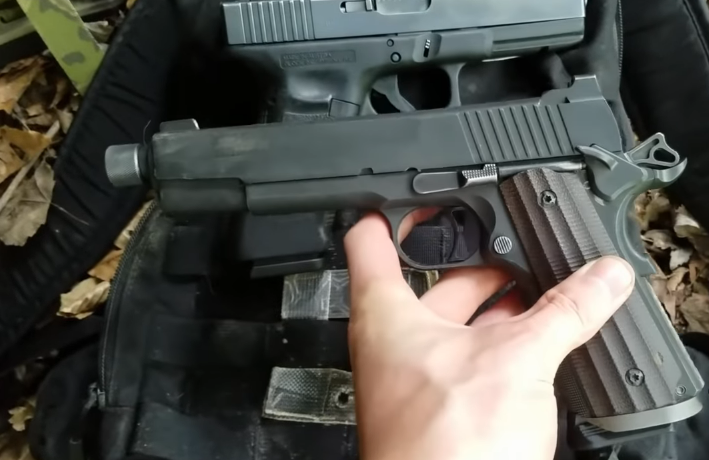
As has been briefly discussed in other sections above, the size of a bullet has a lot to do with its performance abilities. When debating a 45 and a 9mm, size is likely to heavily influence your choice.
The size of a bullet determines muzzle velocity, action on impact, gunpowder containment, and more. Make sure to pay careful attention to factors that either benefit or suffer from the size of a bullet.
45 Size

A Deeply Discounted Defender Series 1911
To encourage consumers to examine the value of Springfield Armory 1911s, the company is launching its second Defender Series sales event in the form of this...
Although it may not seem like it, the bullet's diameter is one of the characteristics that set a 45 and 9mm apart the most. The diameter of a 45 bullet is typically around 11 or 11.5 mm. While this is a tiny measurement, it is substantially larger than a 9mm bullet. The larger diameter of a 45 bullet makes its performance very different from a 9mm.
For instance, the larger diameter of the 45 bullet will allow it to have a significantly larger casing that can hold more gunpowder. While two bullets of the same caliber are hardly ever the same in terms of gunpowder amount, this makes two different caliber bullets very different.
The amount of gunpowder in a bullet is one factor determining how powerfully it is released from the chamber. Although, since a 45 is a bigger bullet than a 9mm, the gunpowder does not necessarily make it move faster.
The grain of a bullet - that is, precisely how much the bullet weighs - also plays a role in the capabilities of a bullet. A 45 typically has a 230-grain bullet weight. This is quite heavier than a 9mm, which gives the 45 both advantages and disadvantages.
Since it is a heavier and wider bullet, a 45 might be believed to have more stopping power. As you know already, however, this opinion is highly up for debate. Nonetheless, if it is a hollow point bullet, the larger bullet will more effectively tear through a bigger surface area of a soft target. In this sense, a 45 performs excellently.
You must also consider the size of a handgun that fires 45 bullets. Take one of the most popular handguns, an M1911. A fully loaded M1911 weighs three pounds. In terms of a small handgun, this is pretty heavy.
- Large diameter allows for a big surface area when bullet expands and mushroomsA heavier bullet might have greater stopping power
- Larger, heavier bullet has reduced velocityA heavier gun to fire a 45 may cause trouble, especially for amateurs
9mm Size

The reality of protection is that you never know when you’ll need it. We took the power and features of our full sized M&P pistols and put them into a slim, lightweight pistol the size of your hand...
A 9mm bullet is smaller than a 45, which has its ups and downs. 9mm bullets have around a 140-grain bullet weight, which is obviously much lighter than a 45 bullet. And, per the name of the bullet, a 9mm bullet is 9 mm in diameter.
As a smaller bullet than a 45, a 9mm will have a much higher muzzle velocity when used in a firearm. Since it moves faster, some 9mm fans believe this makes the stopping power greater than a 45 bullet.
As a hollow point 9mm hits its soft target, it will not expand and mushroom as much as a 45 bullet. However, its higher velocity may allow it to penetrate the target much more deeply than a 45. Again, this debate is one that will remain up in the air for some time.
Fully loaded, a typical 9mm handgun weight is about 2.6 pounds. The 0.4-lb difference is certainly noticeable when compared to a 45 handgun. The lightweight features of the 9mm gun, bullet, and low recoil push back make the 9mm favorable to many marksmen.
- Lighter bullets might have better stopping power from higher velocity and deeper penetration
- Lighter handgun with less recoil
- Less expansion and mushrooming on impact
Why Bullet Size Is Important

Factors affected by bullet size have already been discussed. A larger bullet will cover more surface area upon penetration, retain better accuracy with a suppressor, and greater capacity for holding gunpowder. A smaller bullet has greater muzzle velocity, deeper penetration after impact, and substantially reduced noise with a suppressor.
45 Vs. 9mm Velocity
Now that just about everything has been covered, the last characteristic to compare between 45 and 9mm is their velocities. You have already learned that a 9mm has a higher muzzle velocity, but exactly how much is it, and what does this mean?
A higher velocity can be both good and bad. Before learning why, however, check out the specifics of a 45 and a 9mm.
45 Velocity
Using a 45 ACP again, you can see the muzzle velocity of a 45 bullet. In an in-depth study, the muzzle velocity of the 45 ACP was at least 770 feet per second (fps) and reached a speed of up to 1,130 fps. On average, the speed ranges from about 830-950 fps.
After traveling a distance of 100 yards, a 45 can retain a speed up to 930 fps with about 4 ½ inches of bullet drop. Over the span of 100 yards, -4 ½ inches is an outstanding performance.
- Average muzzle velocity sits around 950 fps
- Bullet drop over a short distance is negligible
- Relatively less recoil (though overall recoil is still more than 9mm recoil)
- Not as fast as a 9mm
- Reduced terminal performance
9mm Velocity
A typical 9mm caliber handgun has a muzzle velocity of 1,201 fps, ranging between 1,090-1,560 fps. Obviously, this is a much faster bullet than a 45. As said earlier, however, the pros and cons of this characteristic will be discussed shortly.
While the statistics for the 9mm did not specifically show how much velocity was retained over a certain distance, it is logical to see how this muzzle velocity will also keep a more solid trajectory over more distance.
- Faster than a 45
- Little to no bullet drop over short to medium distances
- Relatively more recoil (though overall recoil is still more in a 45)
Advantages And Disadvantages Of High Velocity
Whether it be for self-defense, leisure, or competition, it seems fair to assume that a higher velocity bullet would be the best choice, right? Well, that is not always the case. There are several advantages and disadvantages that come with higher velocity bullets:
Trajectory
Thanks to the laws of physics, an object moving at a faster velocity will travel in a straighter line for a farther distance than a similar object moving at a slower velocity. In this sense, higher velocity is great, especially for long-distance shooting.
Terminal Performance
Higher velocity is also beneficial for terminal performance. Especially in self-defense, you want high terminal performance. A smaller bullet like 9mm will penetrate deeper into your target, suggesting that the stopping power would be more sufficient. While something like a 45 might have good stopping power from its bigger diameter, it will not be able to penetrate your target as deeply.
Recoil
The main disadvantage to higher velocity is that it will cause more recoil in your gun. So, a 9mm has more recoil relative to the size of the bullet and gun when compared to a 45. However, since the 45 is so much larger, its recoil is still more powerful overall. With this in mind, it might be safe to say that the relatively larger recoil power of a 9mm is irrelevant since it is still less than a 45.
Takeaway
With all of this information you now know, you might be able to choose what you prefer: 45 or 9mm. However, this is considered The Great Debate for countless sharpshooters, so perhaps the choice is not as simple as it seems. Primary considerations should revolve around what you are using your handgun for - self-defense, leisure, competition, etc. At the end of the day, both a 45 and a 9mm will get the job done. But if you want to base your decision on more specific details, you now have the information that will guide you to making that final choice.
The responses below are not provided, commissioned, reviewed, approved, or otherwise endorsed by any financial entity or advertiser. It is not the advertiser’s responsibility to ensure all posts and/or questions are answered.
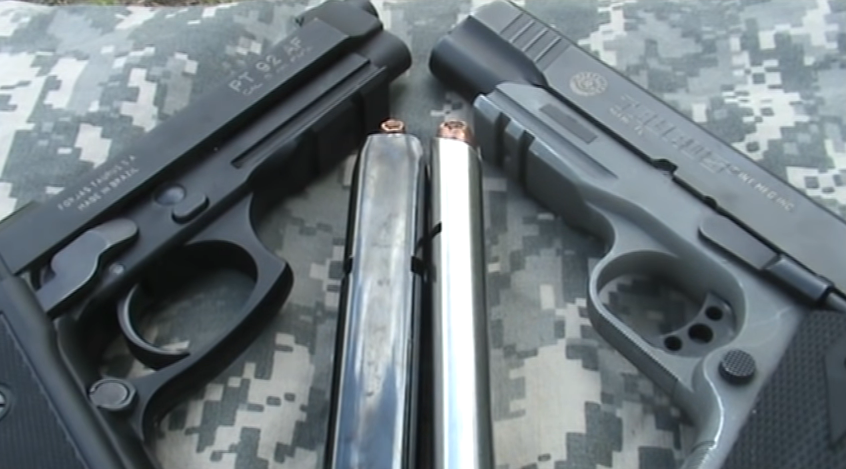

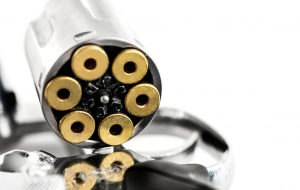
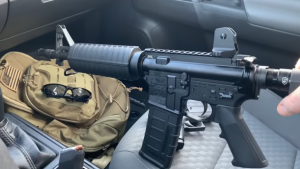
![The Best 2022 Guns For Women [Top 10]](/assets/images/2d31065d92dc958a6b0aa9bf1c583591.png)
